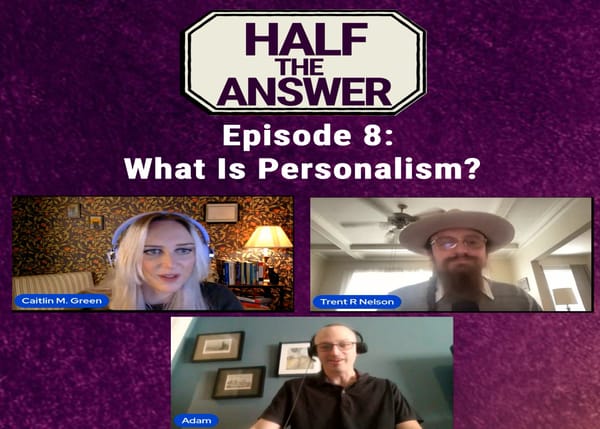Just Make Your Case and Leave Campaign Strategy to Politicians
Politicians will try to win elections whether you self-censor your principled position or not.

It seems you can hardly defend any principle these days without someone pulling out a poll to point out that it is unpopular. Immigration is, of course, at the very top of this list. Many people blame Biden’s mismanagement of the politics of immigration for his unpopularity and Harris’s defeat. The conclusion they have drawn from this defensible but far from certain argument is, more or less, that people who believe in freedom of movement should shut their mouths. It doesn’t matter what the right thing is, it’s not worth it in a polarized environment to attempt to persuade anyone, ever.
Perhaps the most reasonable formulation of this was Matthew Yglesias’s very narrow one:
I believe that it is counterproductive to progressive causes to push candidates in tough races to take high-salience public stances in favor of unpopular progressive causes. Instead, you should encourage candidates to embrace popular progressive causes and allow them to make tactical retreats from fights where conservatives have public opinion on their side.
The argument here is that, in a case where a Democratic victory is a difficult needle to thread already, progressive constituents can engage in self-defeating behavior by making that needle even more difficult to thread. If a district is near 50-50, and 15 or 20 out of the liberal 50 percent insist on the candidate taking a strong stance on an issue that is unpopular with more than half of the district overall, that can make winning near impossible. Or so the argument goes.
My example is contrived. In reality, the people who “push candidates in tough races to take high-salience public stances in favor of unpopular progressive causes” are not large blocs of voters, but activists and media figures who may not even live in the district in question.
The entire matter is rather ridiculous. Politicians will seek to do what they believe it will take to win elections. That is what it means to be a politician, that is a central pillar of their entire role. The politician who fails to do so will not remain in politics for long. Politicians and political parties should absolutely seek to exercise the third face of power, to influence beliefs rather than merely to cater to them. But catering to today’s beliefs in an election year is always going to be part of the job, even if it is simply in the tactical manner Yglesias describes (though one doubts whether Republicans would ever be so forgiving as to allow their opponents to make such a retreat cleanly, rather than confronting them with issues that potentially split the Democratic coalition).
That doesn’t mean we need to be doing their job for them. If you simply surrender your principles in advance, because you’re afraid that association with you will sink Democratic politicians, then what on Earth are we even hoping to elect Democratic candidates to do? There is something particularly galling about wielding immigration in particular as this cudgel. Anyone over 30 with memory longer than a goldfish’s has seen polling on that topic swing thermostatically between the last two presidencies. Must we engage in self-censorship based on a passing moment’s poll results?
Conservatives spent decades building an ideological movement that staked out substantive policy positions that were and are broadly unpopular. There is power in doing so, if judges and administrators are part of your movement, if there are states where your party has large supermajorities, and if control of the federal government rests on factors largely outside anyone’s control. Persuasion is not just about drawing more voters into your coalition but about consolidating the publicly stated beliefs among existing partisans.
When politicians will be in a position to pass laws that cater to those beliefs is a matter of electoral calculus that politicians themselves can make. We don’t need to make those calculations on their behalf and it’s simple hubris to believe a bunch of outside commentators are more capable of doing so.
Most importantly, we are now in a time when all bets are off. It used to be that conservatives could talk a big game about ending the administrative state, comfortable in the knowledge that it was simply impossible to pull off. The dog was never at risk of really catching the car. Now, the Trump administration is genuinely seeking to destroy the foundations of the administrative state.
If they’re going to take their shot, we need to be prepared to do so as well. If they’re going to go after the civil service, we need to be prepared with a plan to reconstruct it better than the already hobbled one we had before the second Trump term began. If they’re going to try and take the Unitary Executive from absurd theory to dictatorial practice, we should be prepared to actually end presidentialism in America once and for all. If they’re going to try to regulate women’s bodies and erase trans people, we should be prepared to enshrine bodily autonomy into law. If they’re going to stack the Supreme Court with loyalists who will give the authoritarian presidency legal immunity and nullify human rights, let’s be ready with a plan to reconstruct the federal court system.
Politics is not won by mindlessly letting polls lead you by the nose. Elections matter, but so do coalition politics, and so do principles.
Featured image is Rivalry between newspapers




